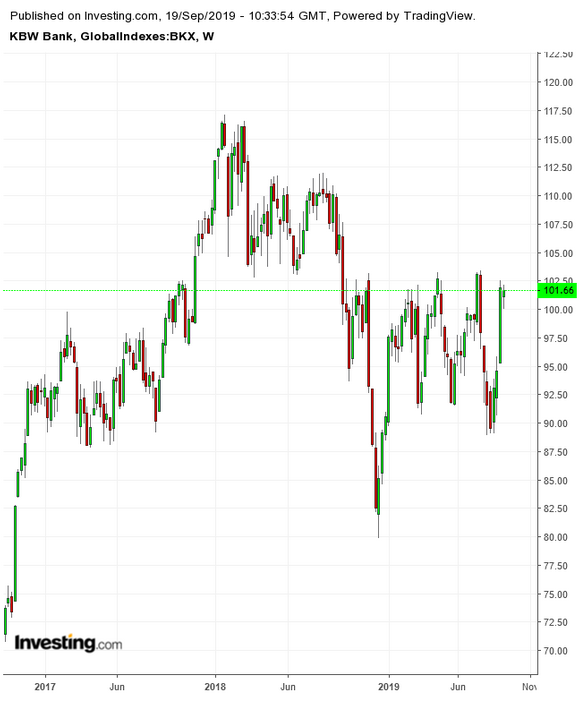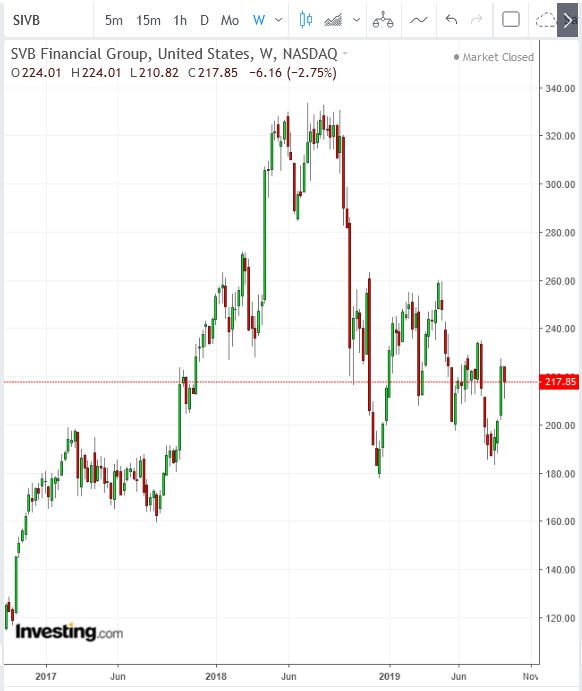Bank stocks have put on an impressive rally of late and have enjoyed a solid 2019 overall. This performance makes some of them good enough to buy into—provided you're patient about when to buy and equally patient about how long to hold.
The KBW Bank Index was up 18.8% for the year as of Tuesday, and some stocks, like JPMorgan Chase (NYSE:JPM), have recently hit 52-week highs. But while consumer spending has been growing nicely and unemployment is at record low levels, bank stocks are vulnerable to market volatility.

They were hit hard during the ugly market slump in the fall of 2018 that saw the KBW Bank Index ending the year down 18%. At the same time, JP Morgan dropped 14.7%. U.S. Bancorp (NYSE:USB) fell 14.7%, and SunTrust (NYSE:STI) was off nearly 22%. The slump may have helped propel SunTrust's pending $66 billion merger with BB&T Corp. (NYSE:BBT) that will create the nation's sixth largest bank.
Still, banks are facing some tricky headwinds just now. The knottiest, currently, may be dealing with the U.S.-China trade fight and concerns about economic growth in Europe and elsewhere.
That's pushed interest rates down dramatically this year, pressuring the bottom lines of every financial company. Charles Schwab (NYSE:SCHW) recently said it was laying off 600 workers because profits are getting squeezed. As well, the 10-year Treasury is still yielding less than 2%.
A second headwind is longer term: what if a Democrat defeats Donald Trump next year?
Since coming into office, the Trump administration has been loosening many banking regulations, especially rules that boost consumer protections. But most of the Democratic candidates have been critical of the banking industry, especially Sen. Elizabeth Warren, D-Ma., who helped set up the Obama administration's Consumer Financial Protection Bureau, and Sen. Bernie Sanders, D-Vt., who proposed breaking up the biggest banks during his 2016 campaign.
A last headwind is lingering memories of the great financial crisis. For good reason: the KBW Bank index fell nearly 80% between its January 2007 peak and March 2009 bottom. Hundreds of institutions were bailed out or merged into others.
At the same time, while consumer borrowing is back to all-time highs, there is some caution, the American Banker has reported. Homeowners take out home-equity loans to finance improvements. And consumers proved in the financial crisis they still pay off their car loans.
Banks, however, can't be dismissed for yet another reason. They are essential cogs in any modern economy.
Which is why their stocks are attractive for long-term holders (years, not months), especially those who count on dividends. Most big bank stocks have dividend yields in the 3% range.
Two additional factors also work in banks' favor:
- The institutions that bet aggressively on speculative and risky loans are mostly gone. And really bad behavior, like fraudulently opening accounts customers didn't know anything about, is getting cleaned out.
- A business-friendly Trump administration wants to lighten the regulatory load for banks. Good for the bottom line, at least for now, though critics worry many rule easings could encourage mismanagement and hurt customers.
Obviously, a great time to buy any stock is when it's slumping. Investors played this out fairly aggressively with financial stocks. Share gains this year make them a bit pricey, so letting them drop may make sense.
Some bank stocks to consider:
JPMorgan Chase: The biggest U.S. bank by assets. Financially strong and able to take over troubled competitors and even clean up its own messes.
Truist Financial: This is the name chosen for the merged SunTrust and BB&T, expected to close by year-end. Both are well capitalized and profitable and operate primarily in the South and Southeast.
Each of their stocks has been on a tear. But mergers are expensive and more complex than managements like to admit. Especially a merger that creates the sixth largest U.S. finacial entity by assets. A post-merger pullback may create a buying opportunity. But then be patient for the ultimate payoff.
U.S. Bancorp: The regional giant has operations from the Midwest to the Pacific Northwest, including a strong position in Oregon and Washington.
SVB Financial Group (NASDAQ:SIVB): The parent of Silicon Valley Bank, which is based in the San Francisco Bay Area but has offices around the world. It is a player in the venture capital/private equity markets.

Shares were hit hard in the Fall 2018 slump and continue to struggle. Note that it doesn't pay a dividend so should be purchased solely for growth potential.
